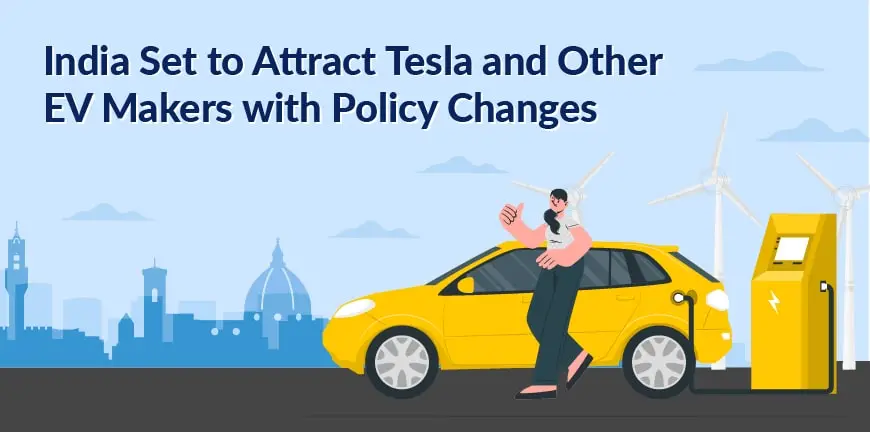Goa Could Be the Next Silicon Valley: Is It Prepared?
13/12/2024
Hire Expert Full Stack Developers in India
14/12/2024India, for long has been planning to incentivize the production of Electrical Vehicles in order to include automakers who currently manufacture with the existing facilities in India, instead of limiting the benefits only to those automakers who are willing to build new plants, according to Reuters. India’s EV policy initially was designed to attract major EV manufacturers, especially Tesla to enter the Indian market and manufacture locally by reducing the import tariffs on the production of high-end electric vehicles. Elon Musk led Tesla had also recommended the city of Delhi for setting up its manufacturing plant. However, those plans didn’t come to life at the time, which led the government to further engage stakeholders again.
Tesla’s Plans to Set Up in India
While there has been a pause in the Indian Showroom Search, in the meantime, Tesla has initiated preliminary discussions with DLF regarding space in the capital region, according to two sources with direct knowledge of the developments.
As per source Tesla is seeking a customer experience centre with an area of 3000 to 5000 square feet, with an additional space. Additionally, they are also seeking a space triple this size for service and delivery operations. Some of the locations considered for the set up include DLF’s Avenue Mall in South Delhi which already houses large international retailers like Uniqlo, Mango and Marks and Spencer and the Cyber Hub complex in Gurugram.
However, there are still unanswered questions regarding the company’s approach to vehicle imports, whether at the 100% tax rate or under India’s new policy allowing certain EVs at 15% import duty.
The Government Efforts in Attracting EV Makers
In an effort to encourage big EV manufacturers, the government is set to host a workshop who are interested in the scheme, The workshop will be acting as a platform for companies to understand the scheme better. This will be the second round of consultations, as the first was already held in the month of April this year, which included major companies like tata motors, Maruti Suzuki, Hyundai, BMW and Mercedes. The Scheme to Promote Manufacturing of Electric Passenger Cars in India (SPMEPCI) allows companies to import electric cars with reduced tariffs under certain conditions. Here’s how India is achieving its aim of creating an attractive investment environment whole promoting domestic manufacturing-
1. Reduction on Import Duties
The new policy requires companies to invest at least $500 million (approximately ₹4,150 crore) over five years in local manufacturing facilities either by building EV factories or setting up EV charging stations. These firms can import EVs at a reduced import duty of 15% which is significantly lower than the current rates of 70%- 100% compared to the usual higher rate.
Approved companies can import electric cars at a reduced 15% customs duty on vehicles costing $35,000 and above.
Source: The Mint
2. Domestic Value Addition Requirements
Firms must achieve at least 25% domestic value addition (DVA) within three years and increase it to 50% in five years. This would require a significant portion of the components used in EVs to be sourced or manufactured in India.
Source: The Tech Portal
Companies can import up to almost 8000 electric cars annually at the reduced rates with unused import allowances being transferable to the next year.
3. Incentives for local manufacturing
Companies achieving an investment threshold of $800 million will be allowed additional import concessions for up to 40,000 EV units over five years
Source: The Tech Portal
This is intended to encourage the establishment of EV and battery manufacturing plants, creating jobs and boosting technological innovation in India.
4. Promote an EV Ecosystem
The change in the policy puts an emphasis on developing the EV ecosystem by supporting local manufacturing and lessen the dependence on imports from outside, ultimately reducing the cost of EVs for Indian Consumers.
5. Focus on Global and Local Players
Tesla, which has long sought reduced import taxes to enter India, is a key target of these reforms. Other players, including Vietnamese EV maker VinFast and local giants like Tata Motors, also stand to benefit.
Companies that have Actively Shown Interest
According to the Reuters report, here are some of the companies that showed real interest in the policy changes.
1. Toyota
There was an inquiry from the officials whether the EV policy would permit the investment in a separate assembly line within a plant that produces multiple powertrains. They also wanted to clarify whether the manufacturing and installation of charging stations would be considered part of the $500 million investment requirement.
2. Hyundai
Had questions regarding money spent on research and development and whether or not it could be counted toward the $500 million investment requirement. The officials from Hyundai also revealed that they are awaiting the final policy and guidelines.
3. Volkswagen
According to Reuters, the company is seeking more flexibility with the investment timeframe and that they have requested permission to invest 75% of the $500 million within the first three years of the five-year plan, rather than the current requirement of 100%. Additionally, the company is looking to clarify whether investments made by suppliers would be eligible.
Impact of the Policy Changes
Tesla is expected to leverage the changes in the policy made by the Indian Government and introduce models like the Model 3 and Model Y to the Indian market. The government has also emphasized domestic production by linking incentives to local manufacturing and sourcing commitments, ensuring a balance between attracting foreign investment and supporting Indian automakers like Tata Motors and Mahindra & Mahindra
This move aligns with India’s broader goals of increasing EV adoption, reducing crude oil imports, and enhancing air quality. With a target of 30% electric car sales by 2030, the policy is set to accelerate innovation, create jobs, and make India a competitive hub for EV manufacturing.
Contact Us For Business Enquiry

Rajkumar Shanmugam
Rajkumar Shanmugam is the Head of HR at ALP Consulting, bringing over 19 years of comprehensive HR leadership experience across India and international markets. His expertise spans talent acquisition, employee relations, performance management, compliance, and HR transformation. Rajkumar has a proven track record of driving people-centric initiatives, enhancing workplace culture, and aligning HR strategy with business goals. With extensive experience in US staffing operations and global mobility, he continues to lead organizational excellence through innovation and employee engagement.




